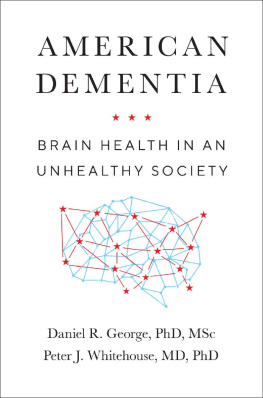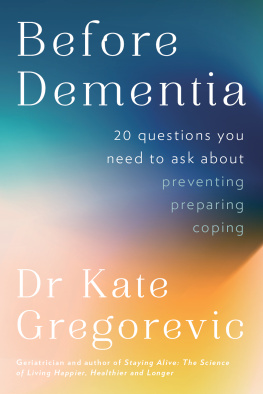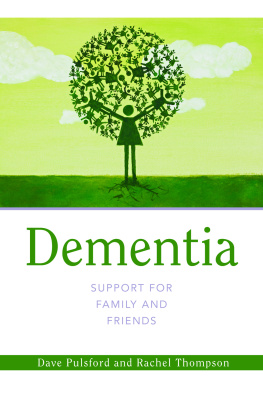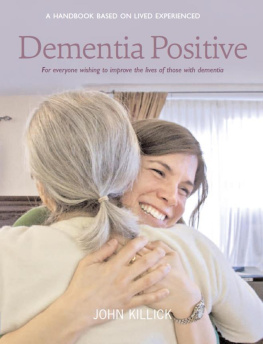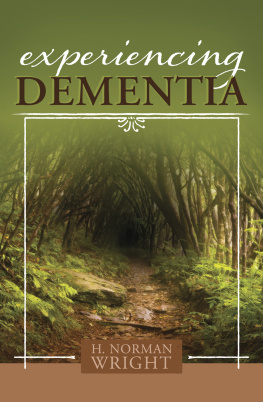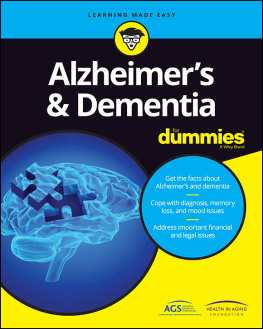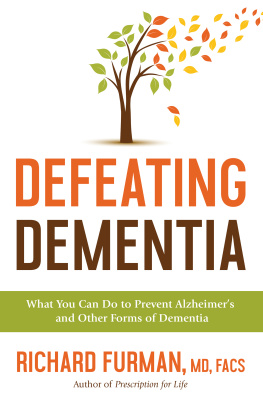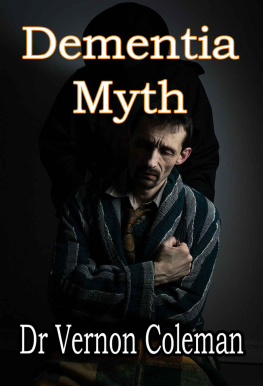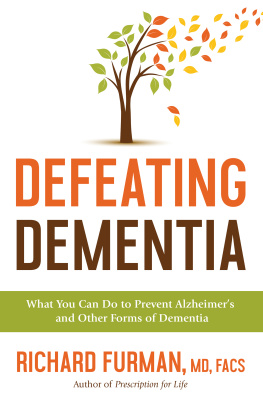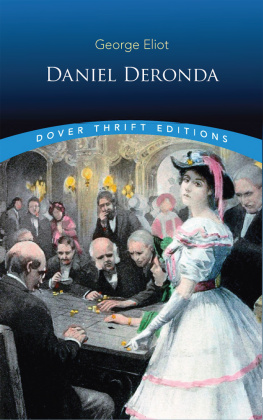Daniel R. George - American Dementia
Here you can read online Daniel R. George - American Dementia full text of the book (entire story) in english for free. Download pdf and epub, get meaning, cover and reviews about this ebook. year: 2021, publisher: Johns Hopkins University Press, genre: Politics. Description of the work, (preface) as well as reviews are available. Best literature library LitArk.com created for fans of good reading and offers a wide selection of genres:
Romance novel
Science fiction
Adventure
Detective
Science
History
Home and family
Prose
Art
Politics
Computer
Non-fiction
Religion
Business
Children
Humor
Choose a favorite category and find really read worthwhile books. Enjoy immersion in the world of imagination, feel the emotions of the characters or learn something new for yourself, make an fascinating discovery.
- Book:American Dementia
- Author:
- Publisher:Johns Hopkins University Press
- Genre:
- Year:2021
- Rating:3 / 5
- Favourites:Add to favourites
- Your mark:
- 60
- 1
- 2
- 3
- 4
- 5
American Dementia: summary, description and annotation
We offer to read an annotation, description, summary or preface (depends on what the author of the book "American Dementia" wrote himself). If you haven't found the necessary information about the book — write in the comments, we will try to find it.
American Dementia — read online for free the complete book (whole text) full work
Below is the text of the book, divided by pages. System saving the place of the last page read, allows you to conveniently read the book "American Dementia" online for free, without having to search again every time where you left off. Put a bookmark, and you can go to the page where you finished reading at any time.
Font size:
Interval:
Bookmark:
AMERICAN DEMENTIA
Brain Health in an Unhealthy Society
Daniel R. George, PhD, MSc
Peter J. Whitehouse, MD, PhD

JOHNS HOPKINS UNIVERSITY PRESS
Baltimore
2021 Johns Hopkins University Press
All rights reserved. Published 2021
Printed in the United States of America on acid-free paper
2 4 6 8 9 7 5 3 1
Johns Hopkins University Press
2715 North Charles Street
Baltimore, Maryland 21218-4363
www.press.jhu.edu
Library of Congress Cataloging-in-Publication Data
Names: George, Daniel (Daniel R.), 1982 author. | Whitehouse, Peter J. author.
Title: American dementia : brain health in an unhealthy society / Daniel R. George, PhD, and Peter J. Whitehouse, MD, PhD.
Description: Baltimore : Johns Hopkins University Press, [2021] | Includes bibliographical references and index.
Identifiers: LCCN 2020022479 | ISBN 9781421440477 (hardcover) | ISBN 9781421440484 (ebook)
Subjects: LCSH: Alzheimers diseaseGovernment policyUnited States. | Alzheimers diseaseEconomic aspectsUnited States. | Alzheimers diseaseSocial aspectsUnited States. | Right to healthUnited States.
Classification: LCC RC523 .G464 2021 | DDC 362.1968/31100973dc23
LC record available at https://lccn.loc.gov/2020022479
A catalog record for this book is available from the British Library.
Special discounts are available for bulk purchases of this book. For more information, please contact Special Sales at .
Johns Hopkins University Press uses environmentally friendly book materials, including recycled text paper that is composed of at least 30 percent post-consumer waste, whenever possible.
To our families, to those affected by and at risk for dementia, and to the prospect of a more humane, hopeful, and sustainable future for all the species on our planet
1
Occupy Alzheimers!Setting the Scene for Resistance
2
Alzheimers and the Neoliberal TurnPolitics of Anguish, Visions of a Cure
3
Alzheimers TodayInconvenient Truths in the Marketplace of Memory
4
Treating PopulationsCollectively Strengthening the Brain Health of the Many, Not the Few
5
Flint Still Doesnt Have Clean WaterWhat the Lead-Poisoning Tragedy in Michigan Means for Alzheimers
6
#PoorLivesMatterFighting Poverty to Resist Alzheimers
7
Turning Up the Heat on Global WarmingThe Neurologic Costs of Climate Change
8
Occupy the Nursing Home!Breaking Down Walls and Breaking Out Socialceuticals
9
A Bridge beyond LonelinessThe Gathering Momentum of Age- and Dementia-Friendly Communities
10
The Intergenerational SchoolsDesegregating and Revaluing the Cognitively Frail
The idea for this book emerged in 2017 while pondering a simple question about a complicated but rather exciting finding: Why have dementia rates appeared to decline in the United States and other Western countries over the last decade? Given the failures of big pharma, which has achieved a 99.9% fail rate for Alzheimers drugs since the turn of the century, this phenomenon ostensibly had little to do with biotechnology or free market innovation. So what the heck was going on to reduce dementia?
As we began investigating the question, delving into the recent studies and reaching out to our network of Alzheimers experts around the world, the answer became clear: the emerging trend we were studying was strongly linked with particular historical and political-economic circumstances realized after the Great Depression and World War II that brought about widespread access to brain-healthy resources like education, quality health care, and cleaner air, soil, and water. At a historical juncture when the world had been mired in deep crisis, the international postwar social democratic consensuswhich took the form of the New Deal in the United Stateshad transformed public institutions in more egalitarian ways for tens of millions of citizens, while investing heavily in public health. In improving the material conditions that shaped the biological destinies of countless bodies and brains, the active interventions of Western states seemingly helped reduce long-term risk for dementia for those now in their graying years.
Unfortunately, as a society we have abandoned this wisdom. Over the last four decades, our political-economic system has once again been thrown badly out of balance. Just as in the Gilded Age that preceded the Great Depression, corporations and the ultra-wealthy have amassed unprecedented levels of riches, effectively capturing the government and using it to upwardly transfer wealth, roll back social protections, and turn unfettered free markets loose in the United States and around the world. Gradually, our political classstrongly co-opted by moneyed interestshas undone many of the egalitarian societal gains made during the postwar social democratic period, which created a robust, thriving, and healthy middle class; extended collective life expectancy; and created the material conditions for the improved lifespan brain health we are witnessing in our current elders. We now live in a society marked by historic income and wealth inequality, stagnant wages, falling lifespans, failing public and private institutions, deep-seated individualism, and general precariousness, anxiety, and despair. New Dealera safety nets have been frayed by austerity policies that have limited access to brain-protective resources and have left the average persons well-being increasingly susceptible to the whims of free markets. Environmental protections and public health regulations that have safeguarded the health of our brains and bodies but limited profit have been dismantled or removed as market inefficiencies.
In short, the political-economic reordering of our society over the past several decades around hyper-capitalist principles has reduced our shared commitment to one another and made us less healthy in every sense.
In this volume we put forward a relatively simple thesis based on the current evidence: that winning the struggle for a fairer political-economic order where prosperity is more inclusively shared and the publics health and well-being is once again aggressively protected will provide the conditions for everyone to build greater resilience to brain aging. Our message is that we, as a society thrown badly out of balance over the last forty years of runaway capitalism, have become so intellectually deficient, so behaviorally unmoored, and so functionally impaired that it represents a long-term case of American dementia. At present, our countryand the globalized worldspolitical economy is rigged to benefit the very few to the detriment of our collective health. It urgently needs to be leveled againmore sanely and democratically reorganized around an enlightened collectivism that reduces unnecessary large-scale suffering, which is damaging our bodies and brains, and improves the failing institutions, structures, and policies that shape our collective destinies.
What we are talking about when we talk about addressing our American dementia, then, is making life better for peoplecreating healthier and more equitable material conditions for our neighbors (and their brains) to exist and age in across their lives. This world is one where everyone has a right to nutritious food and uncontaminated water, health care, an enriching education, housing, a secure job that pays a living wage, a humane retirement, and basic environmental securitya world that eradicates random senseless cruelty, where no one is denied a dignified life, and where no one is too poor to live. Simply, what we have learned in pursuing the question we originally posed at the outset of this project is that moving in the direction of a healthier society and restoring our shared commitments to one another will protect our brains, allow us to better care for the aging and vulnerable, and heal our broad societal derangement.
Next pageFont size:
Interval:
Bookmark:
Similar books «American Dementia»
Look at similar books to American Dementia. We have selected literature similar in name and meaning in the hope of providing readers with more options to find new, interesting, not yet read works.
Discussion, reviews of the book American Dementia and just readers' own opinions. Leave your comments, write what you think about the work, its meaning or the main characters. Specify what exactly you liked and what you didn't like, and why you think so.

